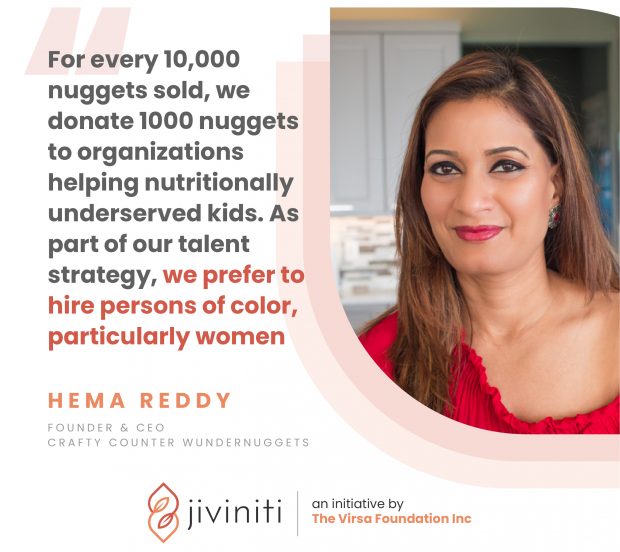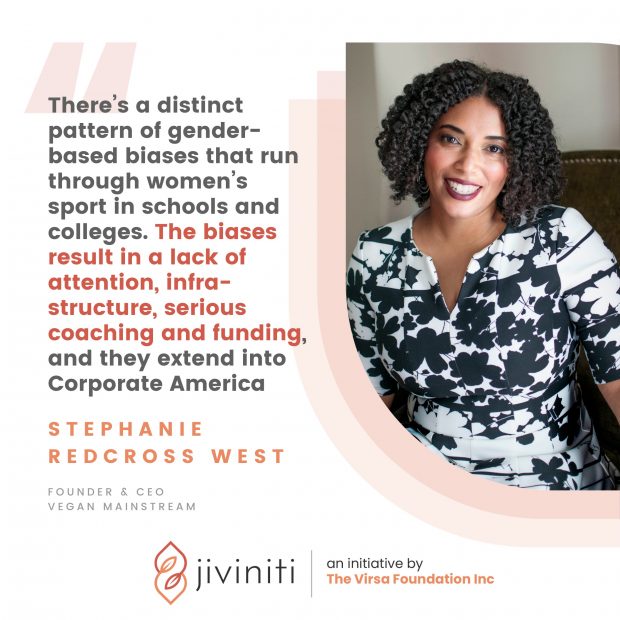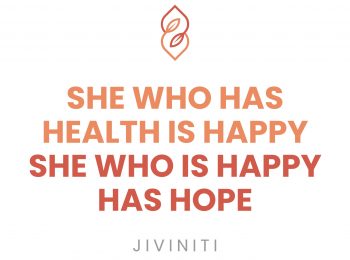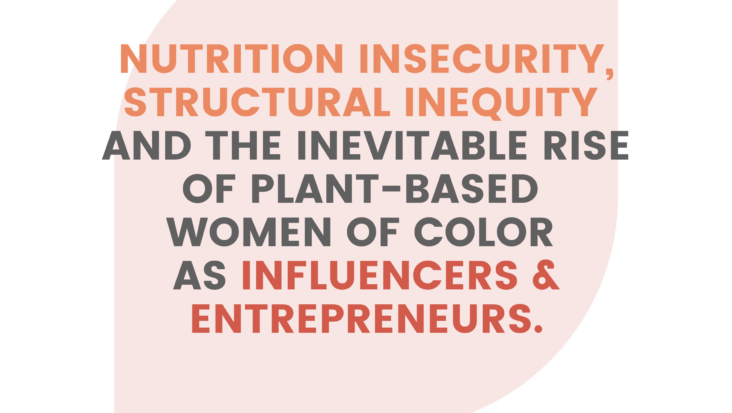by Nivi Jaswal, VLCE
posted Nov 10, 2020
…America faces a hunger and nutrition crisis unlike any this country has seen in generations. Today 14 million children are missing meals on a regular basis—a statistic that’s five times worse than before the Covid-19 pandemic. It’s even worse for LatinX and Black families, with rates of nutrition insecurity spike to 25% and 30%, respectively…
– Reset The Table, by The Rockefeller Foundation
COVID-19 made the situation worse for over 63% LatinX and 54% Black workers who earned low wages even before the pandemic. For minority women engaged in retail and hospitality, jobs disappeared overnight. In health care, it meant more dangerous work at earnings 27% less than white men. Poultry farm workers, predominantly women of color, experienced alarming infection rates while facing mandatory return-to-work orders. In short, the Pink Ghetto just turned into a bigger nightmare than it already was.
Enter, Conscientious Plant-Based Women Entrepreneurs and Influencers. Particularly, Women of Color.
“When we saw the COVID-19 impact on poultry farms, my team and I decided this was our moment to solidify our commitment to a 100% plant-based positioning and exit flexitarian options we had created for those transitioning to eating plant-based,” says Hema Reddy, Founder & CEO of Crafty Counter, an early stage plant-based nutrition startup in Austin, Texas. Hema shared with JIVINITI that her decision helped lift a weight from her shoulders. She is now single-mindedly focused on building a nutritious, compassionate, and climate friendly innovation pipeline.

Covid-19 has boiled over long-simmering problems plaguing America’s food system. What began as a public health crisis fueled an economic crisis, leaving 1 in 3 families unable to afford food. For women-led households living in poverty, Food Apartheid has become a reality. School closures put 30 million students at risk of losing daily meals, adding more stress to families with no access to other options.
Hunger and financial insecurity amid COVID19 have spurred a rise in women-owned commerce in areas of plant-based nutrition and compassionate, climate-conscious businesses.
Is America ready for this tidal wave of entrepreneurial health-seeking women of color? Historically, the situation has left much to be desired.
“Every once in a while, we, as women of color, hit ceilings. We bump into barriers that exist because of biases that are still very present in our society. These ceilings and barriers can impact our dreams and make our journeys more difficult or complicated. But overcoming them helps us grow and become stronger… My experience of bias led to learning opportunities that laid a critical foundation for my professional success,” says Stephanie Redcross West, who spent long years in Corporate America, faced acute gender bias resulting in a toxic experience which shaped her resilience and pushed her to explore different professional avenues. In her JIVINITI interview, she draws parallels between sports and corporations, both rife with institutionalized gender bias.

Stephanie started Vegan Mainstream in 2009 based on a simple idea: To build a pro-vegan world, we need a solid infrastructure of successful businesses and brands to ensure that an ethical lifestyle is accessible to everyone, everywhere. Imagine ethical retail stores, restaurants, clothing options, skin care, cleaning supplies, and educational materials in every mall or community! Today Stephanie and her team develop tools to train and support vegan businesses all over the US and world. In an effort to make her services practical for busy vegan entrepreneurs, Stephanie started offering online team-training programs in 2014 and is working hard to serve even more people during the pandemic.
Optimism, grit, and resilience are the hallmark of women entrepreneurs of color, who have to be very creative in how they manage their resources—professionally and personally.
The Rockefeller Foundation shares that optimism:
While Covid-19 and the resulting economic downturn made the negative consequences of the food system worse and more obvious, the pandemic did not create them, and its end will not solve them. This is an opportunity for America’s policy makers, healthcare and nutrition professionals, and entrepreneurs to rise and work together.
Of the suggestions in the Reset the Table report, the JIVINITI team is most excited about Expand[ing] Food as Medicine.

At the JIVINITI ethnographic research program, our objective is to understand motivational narratives and design solutions for value-based lifestyle change. Access to healthy eating products and programs for underserved women of color is a first step toward a more equal future—one of health, happiness and hope.

Nivi Jaswal is a graduate of the Main Street Vegan Academy and has over 15 years of international corporate experience in brand management and marketing for consumer goods (Unilever), life sciences (Boston Scientific) and the media and research industry (WPP). She has lived and worked in seven different countries and visited 47—and can’t wait to start traveling again once our world is safer! She is a Board-Certified Health and Wellness Coach, trained at the Mayo Clinic, and a Certified Lifestyle Medicine Coach (American College of Lifestyle Medicine). After personally witnessing the power of a whole foods, plant-based lifestyle in reversal of chronic illness, she started a brand strategy and business consulting and coaching practice, solely focused on vegan non- and for-profits—touching across plant-based nutrition, climate change, lifestyle choices, and sustainability.
Nivi also runs The Virsa Foundation Inc., a 501c3 nonprofit in the Boston area, focused on whole food, plant-based lifestyle research programs and intervention for underserved communities, especially women of color, in India (where Nivi is originally from) and USA (her adopted home). She is currently leading an ethnographic research program focused entirely on low income, nutritionally-underserved women of color in the US. The JIVINITI Research Program will offer key insight into behavior change under conditions of socioeconomic oppression and imminent climate refugeeism. While processed foods and beverages tend to focus on those who can pay, Nivi fervently believes that businesses with compassion embedded in their mission cannot afford to ignore those who are often “zip-coded” out of emergent health and wellness options.
Social Media Links:
Nivi Jaswal LinkedIn
JIVINITI LinkedIn
JIVINITI Instagram
Connect with Nivi

